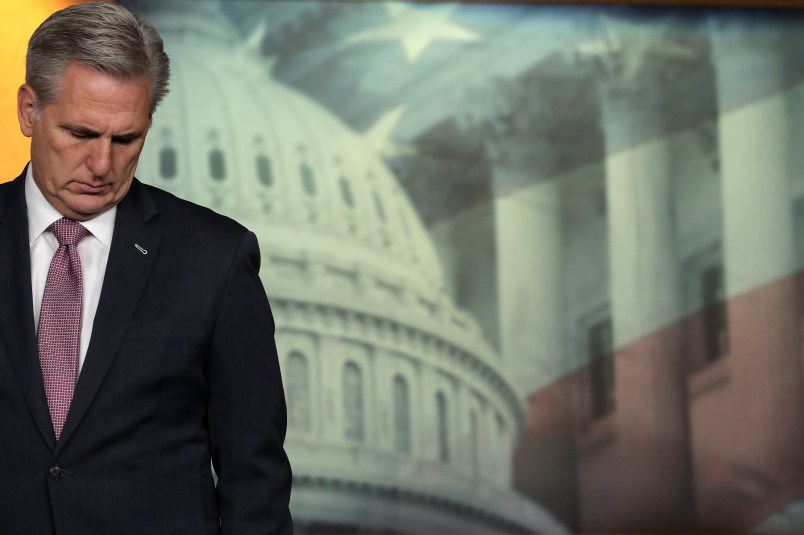A minor Republican jailbreak Wednesday afternoon catapulted the January 6 commission bill to a landslide passage, delivering an embarrassing blow to House Minority Leader Kevin McCarthy (R-CA).
In all, 35 House Republicans joined all of the Democrats. McCarthy announced his opposition to the bill on Tuesday.
The vote came after an emotional — and at times odd — floor debate over the bill, with bill co-author Rep. John Katko (R-NY) oftentimes dispersing speaking time to fellow Republicans who then bashed his proposal.
It ended on a powerful note, with Katko delivering remarks punctuated by his smacking of the lectern.
“I ask you to set aside politics just this once,” he said banging on the wood with every word, “just this once — I beg you — and pass this bill.”
“These people every day are willing to lay down their lives for us,” he said, emphasizing the last word. “They deserve better and we’re gonna deliver this.”
Chant-like, he spelled out the litany of names of the officers who died as a result of the insurrection.
“We are doing this not for us and not for politics — we’re doing it for them,” he finished, the chamber breaking into applause.
While the bill still faces its steepest barrier in the Senate, the unusual show of House Republican support may increase the pressure on their Senate counterparts, many of whom are on the record supporting a commission.
But Senate Minority Leader Mitch McConnell (R-KY) made finding those 10 Republicans much harder for Democrats Wednesday morning, when he came out against the commission.
“I’ve made the decision to oppose the House Democrats’ slanted and unbalanced proposal for another commission to study the events of January the 6th,” he said on the Senate floor.
Some members, including Sen. Roy Blunt (R-MO), have been making the case that such a commission is unnecessary and a waste of time and resources, while Sen. Mike Rounds (R-SD) said that he supports an independent January 6 commission.
Due to the legislative filibuster, Senate Republicans have the power to sink or demand changes to the legislation. So far, the biggest point of GOP contention is the scope of the commission, which currently encompasses January 6 and the events that led up to it. It’s unclear if Democrats will support a commission with an enlarged scope; many of the Republicans who are pushing for an expanded purview want it to investigate supposed left-wing violence, including “antifa” and at Black Lives Matter protests last summer.
Still, the process so far has revealed extensive intra-party schisms in the GOP, as well as the limitations of the power of McCarthy and former President Donald Trump. The latter sent out a Tuesday night statement urging Republicans to vote against the bill.
The defections seemed likely after McCarthy announced his opposition, when many GOP members said they were undecided and some confirmed that they’d vote for the bill anyway. A last-minute bulletin from leadership, urging GOP members to vote against the bill, showed a growing anxiety that leaders may have a mutiny on their hands.
So far, McCarthy has spent much of this term trying to manage the warring factions of his caucus, a messy struggle that has spilled out in public. In April, after months of trying to wrangle the inconveniently outspoken Rep. Liz Cheney (R-WY), he decided to press for her ouster.
While he was ultimately successful, the process amplified some grumbling at his leadership tactics, especially his foisting of Rep. Elise Stefanik (R-NY) on his members as Cheney’s heir apparent. The coda on the saga also only came months after the Cheney rifts became clear, dominating the conversation and throwing the caucus into a total of two no confidence votes in mere months.
As Rep. Adam Kinzinger (R-IL) revealed earlier this month, at least a small contingent of House Republicans had serious doubts about McCarthy’s leadership abilities back in the wake of the January 6 insurrection. After months of GOP infighting and public losses, McCarthy will have to work to make sure that discontent doesn’t spread.



